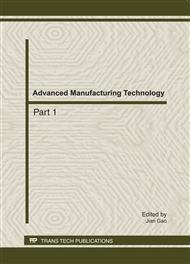p.2046
p.2055
p.2060
p.2064
p.2071
p.2076
p.2082
p.2087
p.2091
Research on Jobshop Scheduling Problem with Energy Consumption
Abstract:
Discrete machine manufacture enterprises have to induce new low-carbon manufacturing model in order to solve a dilemma of mutual restraint between development and electric energy consumption. The paper presents an approach to solve JSP with the objective of minimizing the energy consumption by shortening the distance between electricity peak and valley according to theory of load shifting in electricity. The mathematical model is proposed for JSP with objective of minimizing the energy consumption and processing time of entire batch, then the idea of time division is introduced, and a solving method based on GA built-in eM-Plant is employed to verify the model and get satisfactory scheduling results.Discrete machine manufacture enterprises have to induce new low-carbon manufacturing model in order to solve a dilemma of mutual restraint between development and electric energy consumption. The paper presents an approach to solve JSP with the objective of minimizing the energy consumption by shortening the distance between electricity peak and valley according to theory of load shifting in electricity. The mathematical model is proposed for JSP with objective of minimizing the energy consumption and processing time of entire batch, then the idea of time division is introduced, and a solving method based on GA built-in eM-Plant is employed to verify the model and get satisfactory scheduling results.
Info:
Periodical:
Pages:
2071-2075
Citation:
Online since:
August 2011
Authors:
Keywords:
Price:
Сopyright:
© 2011 Trans Tech Publications Ltd. All Rights Reserved
Share:
Citation:


